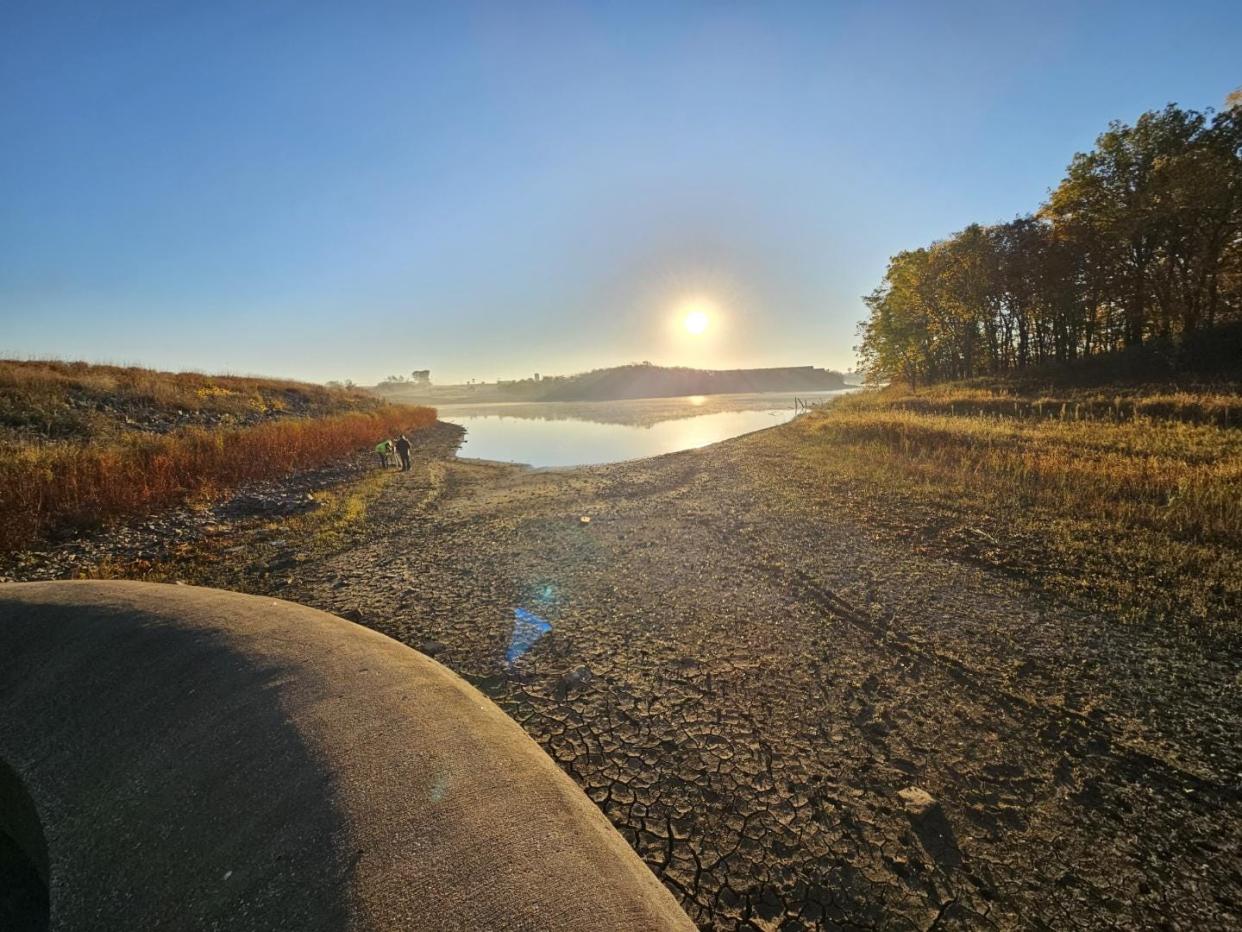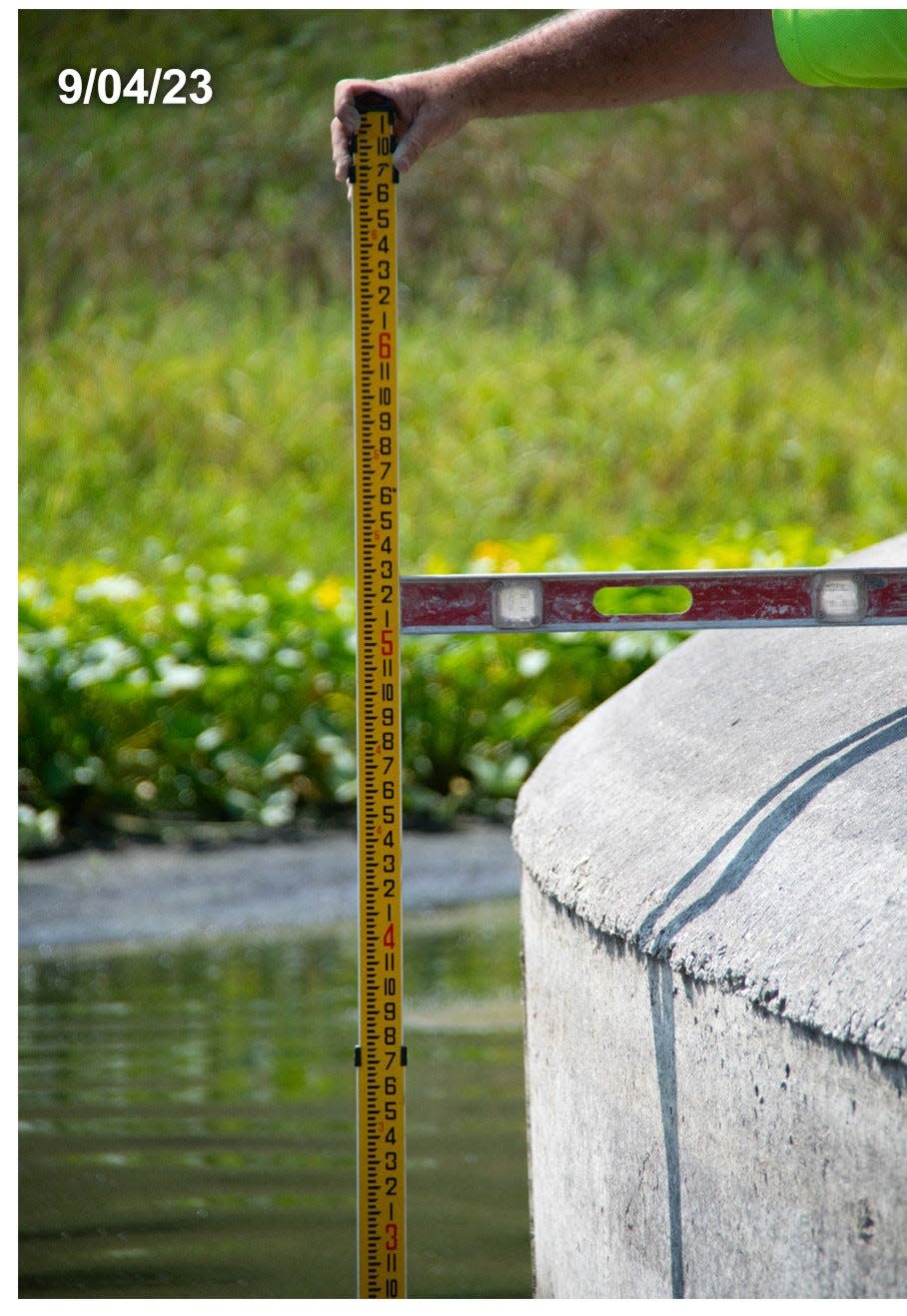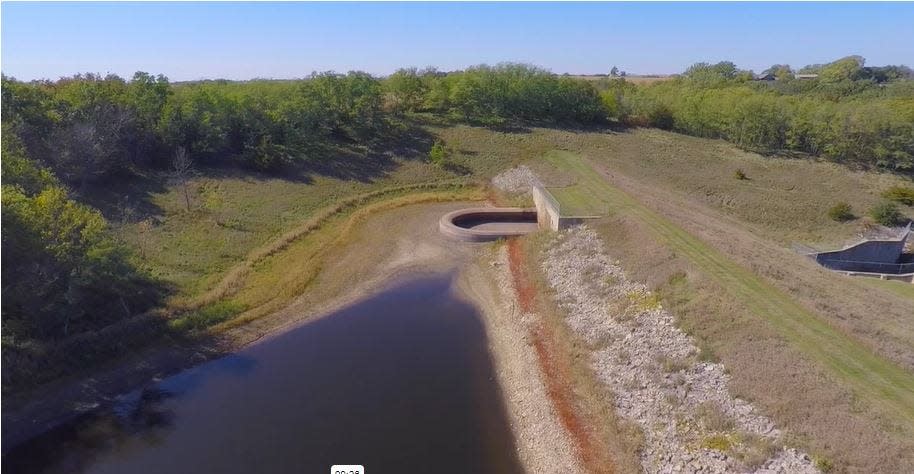Gripped in 3-year drought, south Iowa city weighs using wastewater to bolster water supply

Faced with less than a year's supply of drinking water, Osceola wants state regulators to allow it to use wastewater — treated and disinfected discharge from the city's new treatment facility — to help recharge its drought-diminished water source, West Lake.
The community of 5,540 about 50 miles south of the Des Moines metro would be the first in Iowa to use recycled, treated wastewater as part of its municipal supply, say city and water utility officials. They planned to meet with residents Thursday night to talk about the water challenges Osceola faces.
The Southern Iowa Rural Water Association also relies on Osceola for some of its supply.
More: Osceola issues urgent update on its water supply

Three years of drought have left West Lake 6 feet below it usual level, prompting the Osceola Water Works board this month to ask residents to restrict their water use. The city can safely pull about 800,000 to 900,000 gallons of water daily from the lake, but demand has reached 1.4 million gallons, they said.
The water level is so low that the floating Lakeside Hotel Casino could soon hit West Lake's bottom, said Ty Wheeler, Osceola's city manager. The casino has about 2 feet to go before it's grounded. The company that operates it is unsure what kind of impact coming into contact with the lake bottom would have on the structure and usability of the casino, Wheeler said.
The city estimates it has about 200 days of water supply available, said Brandon Patterson, the Osceola Water Works superintendent. The city is hoping to add 100 days by increasing the height of its lowest lake intake to improve the quality of water available.
"We're trying to figure out how we can maintain our lake level and bridge the gap to getting an additional water supply," Patterson said.
Osceola and surrounding communities are seeking to build a nearly 800-acre reservoir, but that could take six to eight years, given the estimated $100 million cost and permitting challenges, Wheeler said.
Recycling treated wastewater isn't an immediate solution either: It would take up to two years and $16.5 million to begin reusing the effluent to recharge the West Lake watershed.
The city has submitted a request to the Iowa Department of Natural Resources, which is reviewing the proposal, Tammie Krausman, the agency's spokesperson, said in an email.
"All applicable drinking water and wastewater laws for ensuring the process will be safe for the public will apply," Krausman said.
More: Iowa DNR erred in giving pipeline company permit to draw from aquifer, says Sierra Club
Without a substantial increase in rainfall, the city faces about a year before it could run dangerously low on water, Wheeler said. The city could look to the Iowa National Guard to haul in water for residents in an emergency, he said, "But nobody can bring 10 million gallons a month for our large industrial users."
That would have "a huge economic impact on this community, on our major employers and the people they employ," Wheeler said. The largest is Osceola Foods, a Hormel pork plant with about 1,000 workers.
Treated wastewater could actually improve lake's water quality

Despite treated wastewater's "eww factor," testing shows the water leaving the city's new $44 million wastewater plant would likely improve the water quality of West Lake, given the level of treatment the city needs to meet its new state permit requirements, Wheeler said.
The treatment facility is slated to come online Jan. 1. It's "high-quality effluent," Wheeler said.
Cities in the western U.S. have successfully reused wastewater discharge to address water scarcity caused by long-term drought, he said. "The concept is new to Iowa, but it's not new," he said.
An engineering study looking at the option includes adding more treatment to the water before it would enter an existing pond that would feed into West Lake.
The city also looked at other supply options, such as drilling wells. But the nearest aquifers didn't have adequate groundwater supplies to meet demand, according to the engineering study, and the larger Jordan aquifer would be expensive to reach and access. The city also looked at buying finished water from Des Moines Water Works, but that utility wouldn't have enough surplus water to serve Osceola and the cost of providing it would be prohibitive.
Wheeler said the city hopes treated wastewater could help meet Osceola's drinking water needs as it awaits construction of the reservoir. Osceola and the proposed reservoir are in Clarke County. A reservoir commission, which has purchased about 2,500 acres needed for the project, is working to secure about $65 million of the needed funding from the U.S. Department of Agriculture's Natural Resources Conservation Service.
More: Iowa's legendary soil, the bedrock of its economy, is losing its richness, new research shows
Osceola plans to sell bonds to cover most of the remaining costs, using a local option sales tax to repay the debt, Wheeler said. The city would seek a state loan and possible grant to pay for the wastewater reclamation project, he said.
Lawsuits, legislative restrictions on using eminent domain powers to buy land for the reservoir, and the project costs have delayed the Clarke County plan.
"We shouldn't have had the obstacles that were put in front of us in the development of this water supply," Wheeler said. "This should have already been done by now. It shouldn't be this hard to build a public water supply."
Landowners, legislators and others have fought the project, opposing the use of eminent domain to force them to sell land for the project. And they complained that the Clarke County Reservoir Commission sought too much land for the project, expanding it to offer water recreation in addition to water supply.
Water demand rises with drought
Patterson said the Southern Iowa Rural Water Association's plan to begin operating its own water treatment plant in the new year will help reduce some of the demand on Osceola.
"We're all growing fast," said Jeff Rice, the rural water association's general manager. The association provides water to all or parts of 13 rural counties.
While Wheeler said Osceola is adding new residents and homes, Rice said the drought is driving more cattle and hog producers to tap into rural water for their livestock.
Wheeler said reusing the wastewater wasn't something the community foresaw needing when the new wastewater plant was being built. "I wish five, six years ago, when we were in the throes of designing a treatment plant we would have added recirculation into the project," he said. "But it wasn't what anyone was thinking of at the time."
"But now it doesn't look like we have many alternatives to mitigate this risk," he added, saying the wastewater reuse proposal would add to the increased costs that residents and businesses are paying to support the new treatment facility. The base fee has more than doubled over the past decade, he said.
Osceola Foods paid nearly 50% of the cost to build the plant.
City and water officials are holding a town hall meeting to discuss the community's water challenges at 7 p.m. Thursday at the Clarke County Fairgrounds Event Center, 2070 W. McLane St., Osceola.
Donnelle Eller covers agriculture, the environment and energy for the Register. Reach her at deller@registermedia.com or 515-284-8457.
This article originally appeared on Des Moines Register: Osceola is considering using wastewater to recharge its water supply

